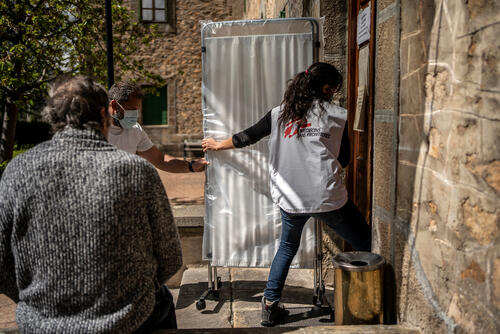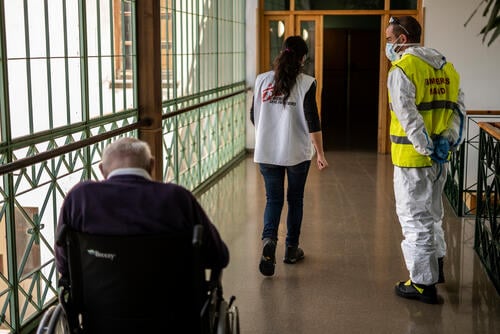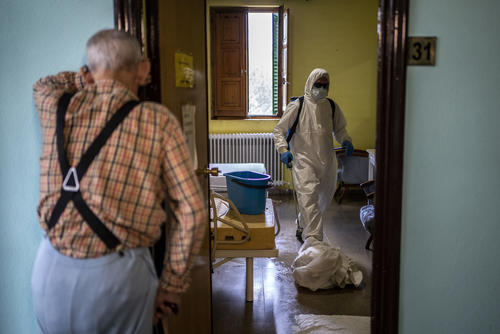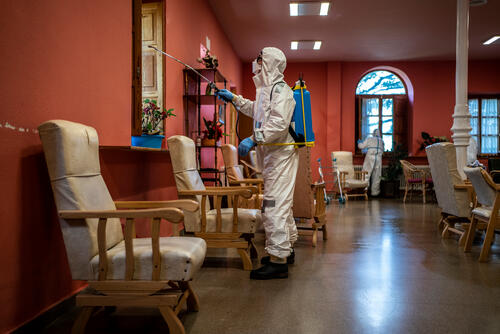- An MSF report published this week highlights serious problems in Spain’s response to COVID-19 in nursing homes across the country, resulting in horrific mortality rates among the elderly.
- We call on the relevant organisations, private companies, and authorities, to urgently improve the response to COVID-19 in care homes across Spain to avoid further suffering for the elderly.
Barcelona – The horrific death toll of elderly people in care homes during the worst months of the COVID-19 pandemic in Spain should never happen again. It is estimated that the elderly who died in these centres (27,359 between 6 April and 20 June, according to the Ministry of Health) represent 69 per cent of all those who died from COVID-19 throughout the country.
According to a report published by Médecins Sans Frontières (MSF), this high mortality rate reveals serious shortcomings in Spain’s care home management model, as well as in the coordination between the different authorities and management companies. This has resulted in the neglect of those most vulnerable to COVID-19 - the elderly in care homes - and the lack of protection for the staff who care for them.
The report, entitled Too little, too late: The unacceptable neglect of the elderly in care homes during the COVID-19 pandemic in Spain, showed a structural deficit in resources, health supervision and contingency planning in nursing homes across the country.
“This combination made it impossible to respond to the pandemic; residential homes for the elderly lacked the necessary health and care resources, which had a direct impact on the health of the residents,” says Dr Ximena Di Lollo, MSF’s care home response coordinator in Spain.
MSF supported almost 500 care centres during the most acute phases of the pandemic in areas such as infection prevention and control, design of zone segregation protocols and the use of individual protection equipment (PPE).
In this report, we call for the urgent need of contingency plans to ensure early warning systems and immediate responses in infection control, protecting those most vulnerable to COVID-19. Provision of financial, human and material resources that strengthen the health system must also be ensured, both in primary health facilities and hospital settings.
"Elderly people must be at the centre of the COVID-19 response to guarantee their right to receive specific, urgent and dignified treatment," says Di Lollo.
Care homes and their staff lack the resources, infrastructure, training or responsibility for medical care, and there was no immediate, adequate life-saving response coordinated with the care homes and health services.Dr Ximena Di Lollo, MSF’s care home response coordinator in Spain
MSF has found that priority was not given to ensuring referrals of sick people in nursing homes to hospitals or other suitably equipped facilities. Nursing homes were forced to care for residents with COVID-19; care which despite their good will, they were not equipped to provide.
“Care homes and their staff lack the resources, infrastructure, training or responsibility for medical care, and there was no immediate, adequate life-saving response coordinated with the care homes and health services.”
Need for infection control mechanisms
Infection prevention and control measures (IPC), key in a pandemic, were also deficient, as was the medical management of patients to stop them deteriorating, whether or not they had COVID-19. As for the detection, surveillance and control of infection rates, MSF recommends the deployment of experienced professionals to advise, train and supervise healthcare personnel working in care homes.
It is essential to appoint and train an IPC supervisor, establish protocols in the event of a new outbreak, and increase the budget and training allocated to IPC measures.
The report also calls for the urgent need to guarantee a reserve supply of protective materials and equipment for nursing homes, as well as timely training with clear and easily adaptable protocols, so that staff can protect themselves and their residents.
“The lack of training in the use of PPE for staff has been one of the major failures of this response. This has been aggravated by the fact that, in addition to being insufficient, the PPE (which arrived late) was not always adapted to the needs of care homes,” explains Di Lollo.

Dignified treatment and care
There was great uncertainty around COVID-19 due to the number of asymptomatic cases and the poor reliability of diagnostic tests. This often led to the implementation of strict isolation measures for residents, sometimes indiscriminately, and to the restriction or denial of last goodbyes, final visits from family, or movement within the care home. This had serious physical and psychosocial consequences for the elderly, who also did not receive any emotional support. As a director of one of the care homes supported by MSF recalled:
“In Eugenia's case, I was afraid that she would let herself die, and I began to take her out every day for a while, to see if she would regain her will to live. And she began to eat, she began to get better, until one day the primary care providers came just when we had her out, and they told me that I was being irresponsible and putting everyone in danger. I had no choice but to return her to her room, they made me feel so bad. She stopped eating again and, within a few days, she died. I’m not saying that she would not have died anyway, but I am certain that she did not want to go through this.”
A balance between isolation, quarantine and coexistence must be established in care homes and psychosocial support is essential – both for staff, residents and their families.
“The managers of these centres must ensure that physical isolation does not isolate residents socially, and that it prioritises their physical and mental health at all times. Confinement should not be done at the expense of the physical and cognitive faculties of the elderly, but according to them,” adds Di Lollo.
MSF also encountered a serious lack of protocols, clarity and implementation of measures for comfort treatment, sedation and palliative care for terminally ill people who had not been referred to hospitals, leaving people to die in avoidable suffering.
"Family visits and last goodbyes should be allowed in people’s final moments, always with the appropriate protection measures. For this, it is essential that care homes have sufficient personal protective equipment, so that the elderly do not have to face such difficult times again, away from their loved ones,” says Di Lollo.

Lack of coordination between the authorities and care home management companies
Finally, the report highlights the lack of coordination between the authorities and private companies working in care homes, including the lack of strategies to prevent and manage the pandemic.
“They prioritised the care response in hospitals, which neglected the elderly in care homes, despite them being the most vulnerable group with the highest mortality rates,” concludes Di Lollo.
A system of ethical quality indicators to assess the impact of COVID-19 on the well-being and quality-of-life of the elderly in care homes, must be urgently developed alongside improvements to the ways of collecting, analysing and publishing data.
MSF calls on the relevant organisations, private companies, and authorities, to urgently improve the response to COVID-19 in care homes across Spain, avoiding further suffering for the elderly.




